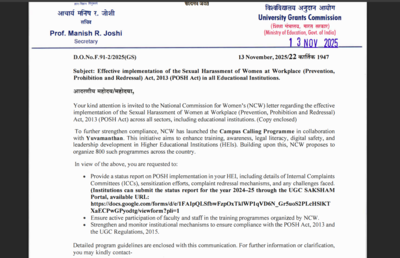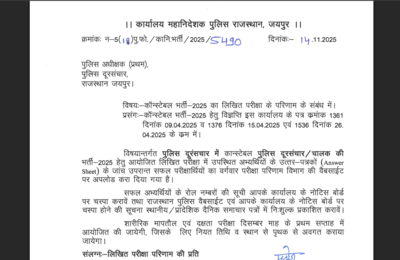NCW seeks strict POSH compliance; UGC tells colleges to submit reports and step up training

The National Commission for Women (NCW) has issued a directive calling for renewed scrutiny of the implementation of the Sexual Harassment of Women at Workplace (Prevention, Prohibition and Redressal) Act, 2013, across Higher Educational Institutions (HEIs). In a letter circulated to universities and colleges, NCW has stressed the need for uniform, fully functional redressal systems and mandatory training to close persistent gaps in compliance.Acting on this communication, the University Grants Commission (UGC) has instructed all HEIs to submit updated reports detailing the status of Internal Complaints Committees (ICCs), sensitisation measures, complaint-handling procedures, and operational challenges. Institutions have been asked to furnish this information for the academic year 2024–25 through the UGC SAKSHAM Portal.
Nationwide training push under the campus calling programme
Central to the NCW’s directive is its newly launched Campus Calling Programme, developed in collaboration with Yuvamanthan. The initiative aims to elevate legal literacy, digital safety awareness, and gender-sensitivity training across campuses, alongside cultivating leadership among students. NCW has proposed the organisation of 800 programmes across the country, marking one of the most extensive safety-focused training drives targeting higher education spaces.The programme’s mandate goes beyond compliance reporting. HEIs are expected to ensure that faculty and staff participate actively in these sessions, which are designed to strengthen understanding of the POSH Act and institutional obligations under UGC Regulations, 2015. This participation is intended to ensure that ICCs are not merely formed on paper but operate with the competence and credibility required to support survivors.
UGC calls for strengthened monitoring and clear mechanisms
The UGC has also underscored the need for robust internal monitoring. Institutions have been reminded to regularly review ICC functioning, maintain transparent reporting channels, and build systems that encourage timely redressal of complaints without procedural lapses. The emphasis on documentation and training reflects long-standing concerns that many institutions continue to fall short in areas such as awareness generation, complaint visibility, and grievance follow-up.
Towards safer and more inclusive campuses
The communication positions campus safety as a key pillar of women-led development, aligning with the broader national objective of creating secure learning environments. With young women forming a significant share of India’s higher education enrollment, the directive signals an expectation that HEIs move beyond statutory formality to demonstrable action.For queries, the NCW has provided designated contact officials from both the Commission and Yuvamanthan, ensuring institutional support during the rollout. As the higher education sector expands, the renewed scrutiny on POSH adherence highlights the crucial link between safety, access, and equitable participation for women across India’s campuses.Candidates can click on the link provided here to download the official notice related to the POSH Act 2025.






